"People have to know the pain, the lifelong pain," said Nuala Malone.
She has never spoken publicly before about the loss her family suffered during the Troubles.
For many years, she felt she could not do so.
A Catholic brought up just off the Falls Road in west Belfast, Ms Malone married her teenage sweetheart Michael Malone, who was also born and brought up in the area.
"People have to know the lifelong pain."
— RTÉ News (@rtenews) April 4, 2023
It's 25 years since the signing of the Good Friday Agreement, the historic deal that brought an end to three decades of conflict in Northern Ireland. But for many families, the price of peace still hurts. Read: https://t.co/uG3CrnT09j #GFA pic.twitter.com/RoQRxExlqb
What set him apart from his peers was that Michael's ambition was to be a police officer and he joined the RUC at a time when the force was viewed with hostility and suspicion by most nationalists.
While all police families felt under constant threat during the Troubles, the couple at times felt particularly vulnerable and isolated because of their backgrounds.
They had to leave the area they loved because of the constant fear of attack and the IRA made a number of attempts to kill him.
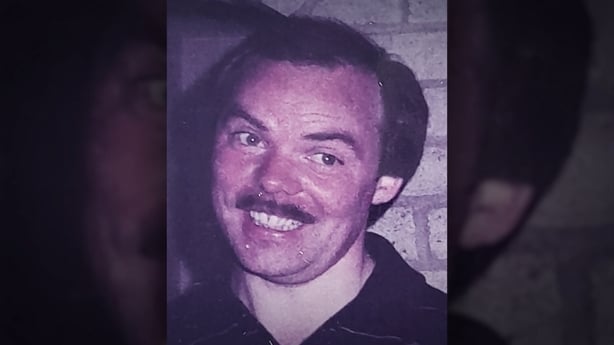
"We had to hide, I had to hide in my life," she said.
"I had to hide what my husband did. I had to drop friendships because I didn't know how people felt about it, I didn't know what their beliefs were.
"My children couldn't know what their father did. They just thought he went to an office, you know, just in case they said something whenever they started school. There were all sorts of difficulties."
On the 26 August 1987, her husband Michael, a 35-year-old father of two, was one of two undercover RUC officers shot dead by the IRA in a bar in Belfast city centre.
"My husband went out to work on Wednesday and never came home again alive. He came home to me on the Friday in a coffin," Ms Malone said.
"You can't imagine the waves that emanate from something like this and reach out to so many people.
"It's destroyed our families and to a large extent destroyed me, because my eldest sister said the children not only lost their father, but they also lost the mother they knew."
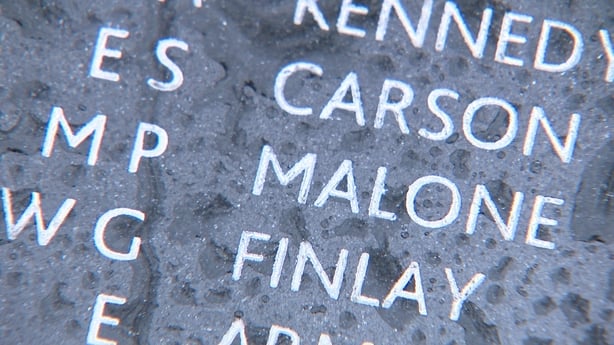
No one was ever charged in connection with Michael Malone's murder and as she watched republican and loyalist prisoners being released early under the terms of the Good Friday Agreement, his widow had to come to terms with the fact that even if someone was convicted at a later date, the maximum they would serve was two years.
Ms Malone said that caused anger and resentment.
'Mixed feelings' over name change
Another highly controversial element of the agreement was a commitment to reform policing, which led to the renaming and rebranding of the RUC, which in November 2001 was replaced by the Police Service of Northern Ireland.
More than 300 RUC officers were killed during the Troubles and the move angered many of their families, former officers and unionist politicians.
"I had very mixed feelings about the name change," said Ms Malone.
"If improvements could be made in any organisation that should happen, and this was supposed to improve the RUC and its structure.
"I don't know they needed to change the name to do that, but I think they had to pander to certain people who brandished guns and were now in power.
"There were a few rogue people in the organisation, a very small percentage, but there are rogues in every profession, in lots and lots of areas of life.
"It's just that such an issue was made of it and the sad thing is, in Europe I think it's the only people force that had no respect from the community."
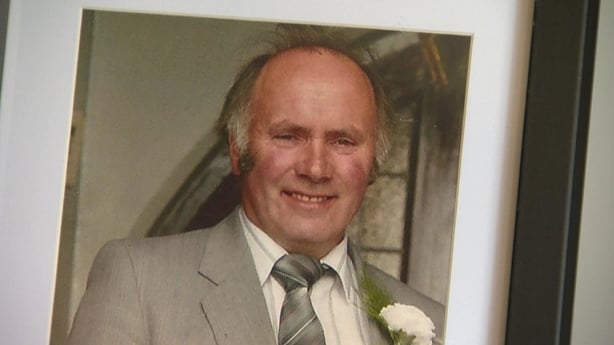
Fiona Kelly was also angered by the early release of prisoners.
Her father, 58-year-old father-of-six Gerard Dalrymple, was one of three Catholic civilians shot dead in an attack by the loyalist paramilitary group, the UDA, in which a member of the IRA was also killed in the village of Castlerock in Co Derry in March 1993.
"It was just unbelievable that someone like daddy was killed in the Troubles," Ms Kelly said.
"He was just the most innocent, kind, caring man you could come across. He had a large network of friends from across both communities."
One of the killers was Torrens Knight, one of the most notorious loyalist figures of the Troubles.
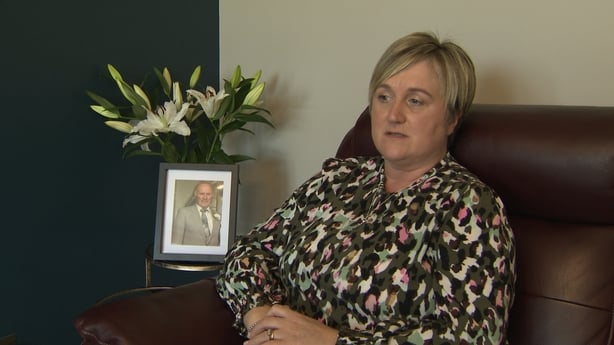
Seven months later, he was also part of a UDA gang that shot dead eight people on the eve of Halloween in the Rising Sun Bar in the nearby village of Greysteel.
That was in retaliation for the IRA's Shankill Road bombing a week earlier, in which nine Protestant civilians and one of the IRA bombers were killed.
One of the killers said "trick or treat" before opening fire.
A high price for peace
The last largescale release from the Maze prison took place on the 28 July, 2000, when 78 republicans and loyalists were freed.
They included Sean Kelly, who had been serving nine life sentences for the Shankill Road bombing.
Torrens Knight was released on the same day. He had been jailed in 1995 and given 12 life sentences for his role in the Castlerock and Greysteel attacks, but he served just five years.
While relieved the Good Friday Agreement signalled an end to the violence, Ms Kelly said victims' families paid a high price for the peace.
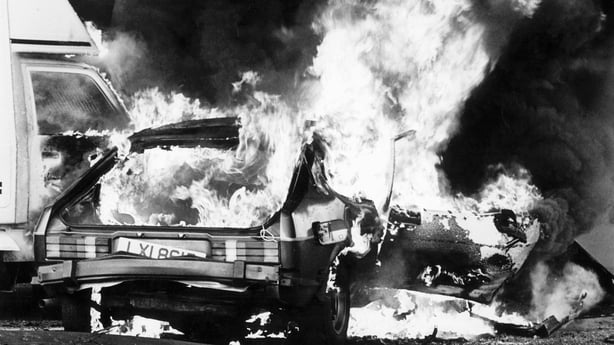
"It was welcome news. I had just become a mum and the thought of her not growing up in a society of fear, where we experienced so much violence, the fact that there were going to be no more victims, no more people like us, was welcome news," she said.
"My children, nieces and nephews are growing up in a very different society to the one that I grew up in.
"But the reality of it was that Torrens Knight was free. He was a free man to go and live and live and work in the society, in the community that we walk in.
"That was very tough for me for the thought of meeting that monster just really terrified me. He could have walked into my place of work, I could have met him in the street, it was just something that was frightening."
The family's anger was compounded in later years when a report by Northern Ireland's Police Ombudsman said there had been collusion between members of the security forces and the UDA gang responsible for the Castlerock and Greysteel attacks, and a number of others.
Not only did Torrens Knight serve just five years, the family believe the attack that killed their father could have been prevented.
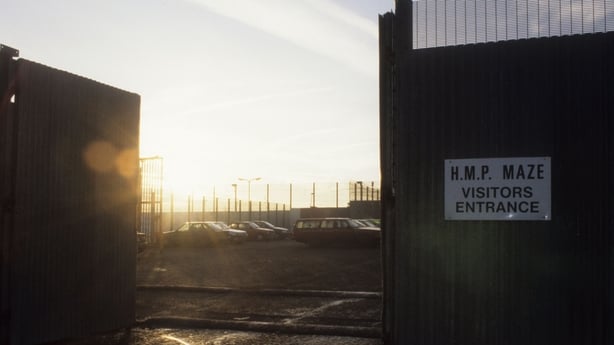
"We now know there was a protected, paid agent within the UDA in the northwest and its actions could have been stopped and lives, like our father’s, could have been saved. That is very hard to come to terms with," said Ms Kelly.
‘No peace with prisoners’
The reality was that the agreement would not have been signed without the early release of prisoners and the commitment to reform policing.
"You couldn't have peace with prisoners," said Brian Rowan, who was BBC Northern Ireland's Security Editor at the time.
"I think they became the conscience of the outside leaderships and negotiators, people who couldn't be left behind and wouldn't be left behind, so the working out of all that was the deal that phased the prisoner release scheme over two years.
"I don't think Sinn Féin and the loyalists would have signed up on Good Friday without the prisoner release scheme agreed."
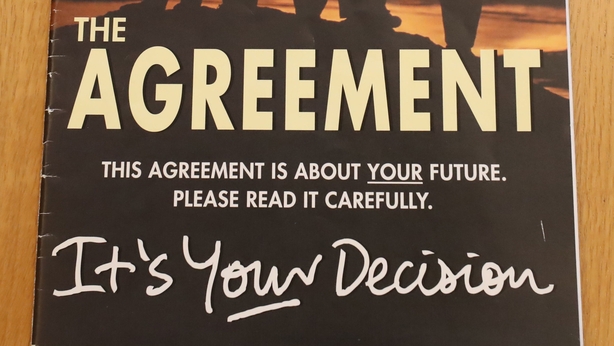
A quarter of a century after the agreement, the pain of knowing her father's killer walks the streets near where she lives remains.
"There was nothing in the Good Friday Agreement for victims, but the ultimate is peace," Ms Kelly said.
"I felt robbed and hurt. We felt like he had robbed us of our father and now he was getting to live his life."
Ms Malone also feels that families of victims of the Troubles were forced to pay a high price to bring them to an end and believes those who have not walked in their shoes do not realise the pain they suffered.
"My voice was never heard and I chose until this point never to have it heard," she explained.
"But people have to know the pain, they have to know the pain, lifelong pain, the sentences we have.
"We're the ones that serve the life sentences, not the terrorists."
We need your consent to load this rte-player contentWe use rte-player to manage extra content that can set cookies on your device and collect data about your activity. Please review their details and accept them to load the content.Manage Preferences







